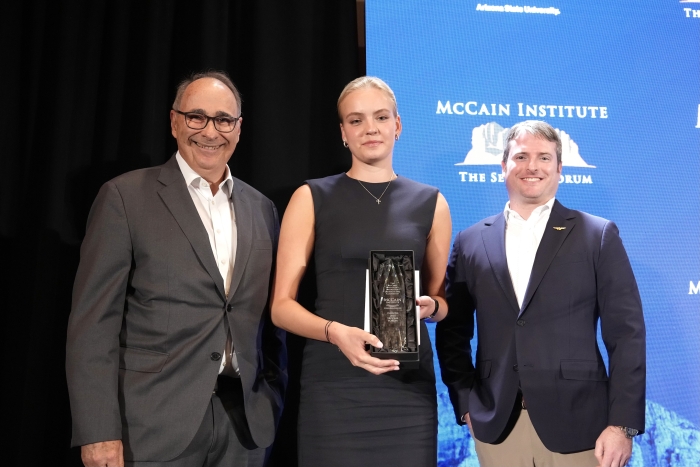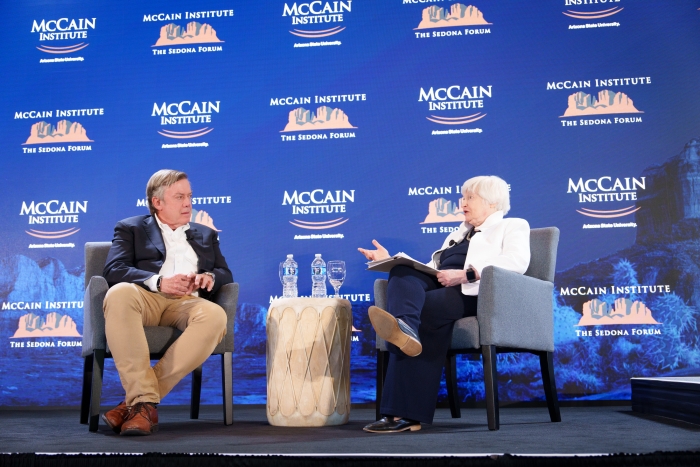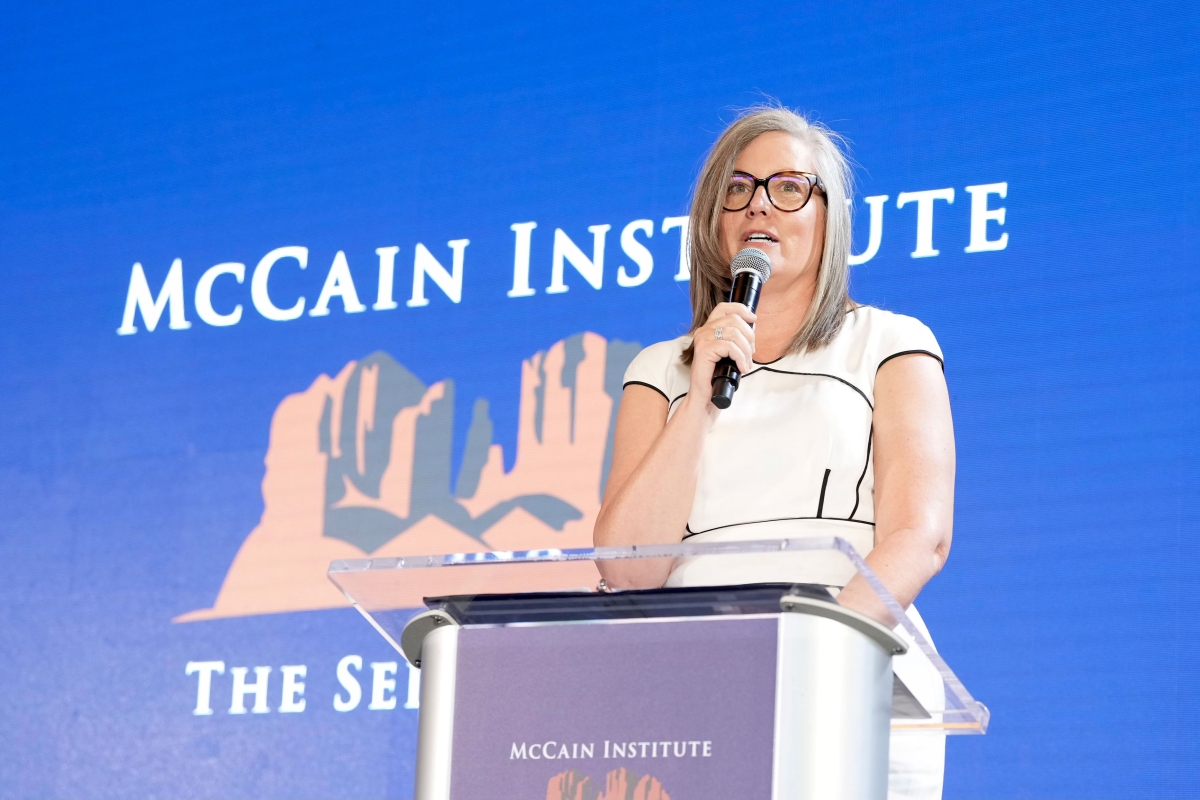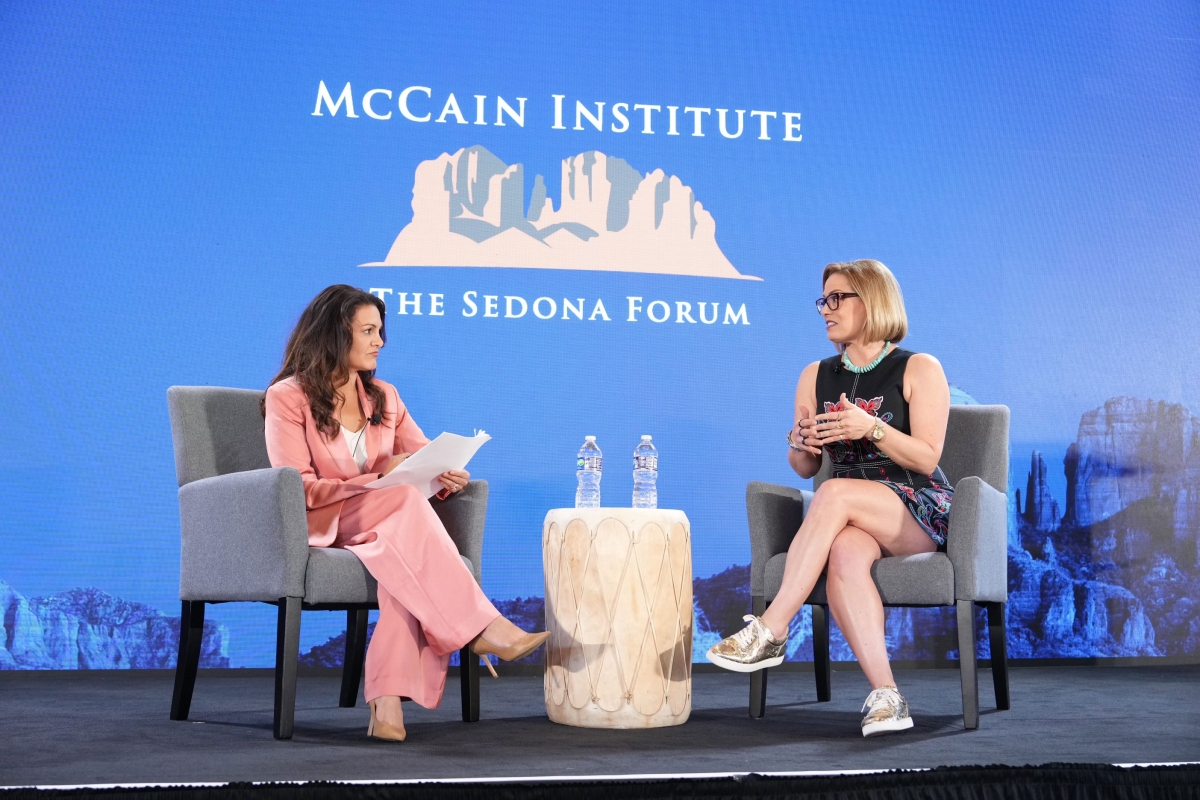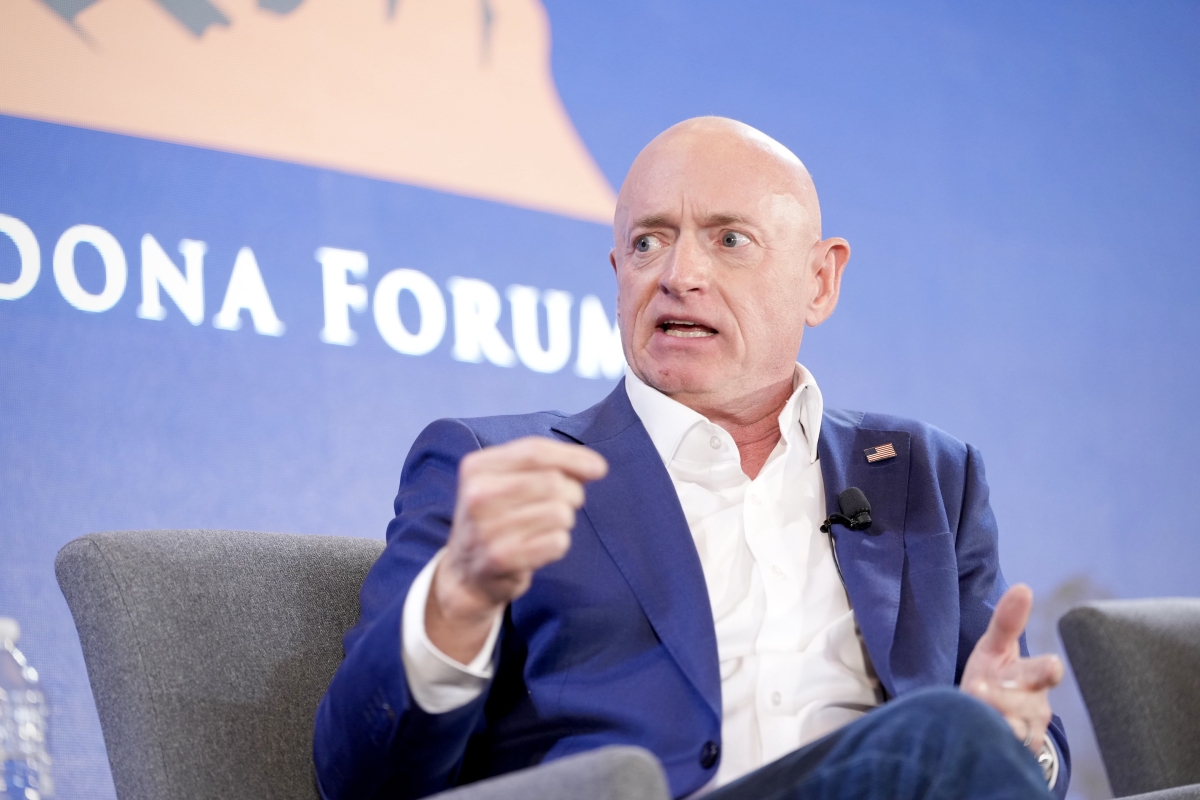Preserving democracy focus of McCain Institute Sedona Forum
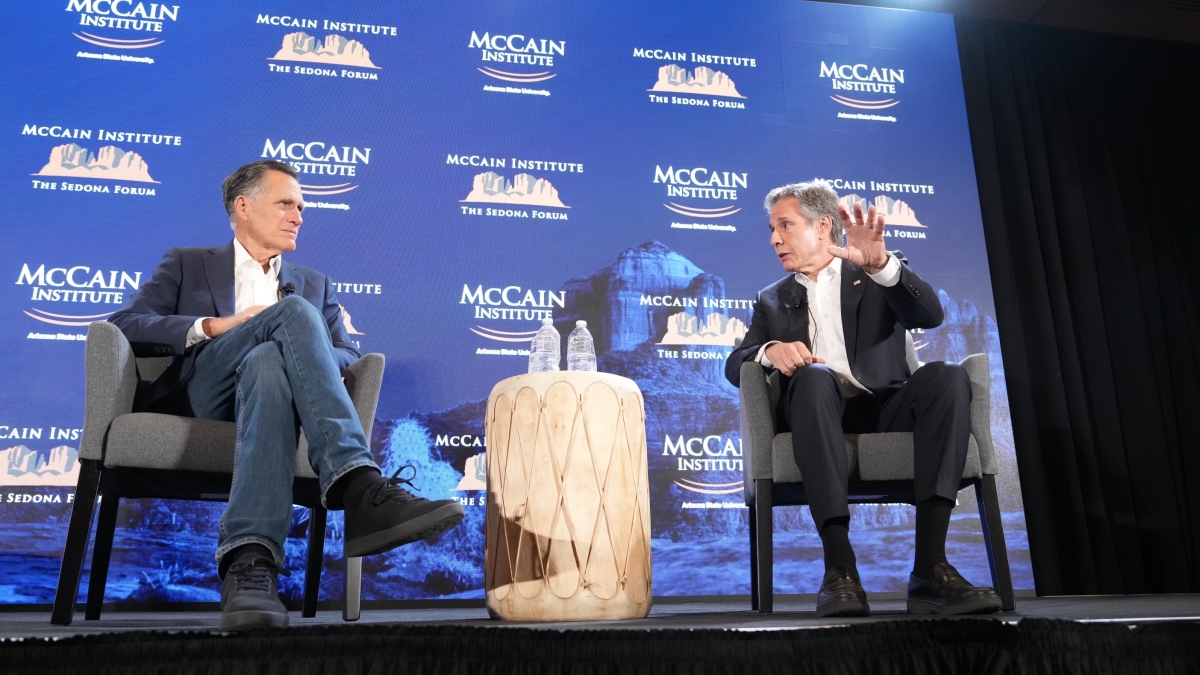
U.S. Sen. Mitt Romney and Secretary of State Antony Blinken discuss the conflict in Gaza at the McCain Institute Sedona Forum. Photo by Paul Morse
Celebrating democracy — and the need to preserve it — was the focus of the 2024 McCain Institute Sedona Forum held over the weekend.
This year’s forum, titled “Securing Our Insecure World,” examined the greatest challenges to democracy, human rights and global security, and featured speakers such as Secretary of State Antony Blinken, Secretary of the Treasury Janet Yellen, Arizona Gov. Katie Hobbs, Arizona State University President Michael Crow and Dasha Navalnaya, the daughter of murdered Soviet dissident Alexei Navalny, who received the McCain Institute's Courage and Leadership Award.
The forum also included a conversation with U.S. Sen. Krysten Sinema, a discussion between Blinken and U.S. Sen. Mitt Romney about the Middle East, and U.S. Sen. Joe Manchin talking about democracy and the digital revolution.
The McCain Institute, which is part of ASU, is based in Washington, D.C., and focused on impacting the nation and world’s most critical issues and discussions.
All the speakers praised the late Arizona Sen. John McCain for his unwavering decision to put country first and political party second.
“A stellar example of integrity and courage was John McCain, who my father respected greatly,” Navalnaya said. “Senator McCain was a true statesman who understood the importance of character-driven leadership and bipartisanship. And he received a lot of blowback for his willingness to cross party lines.
“He acted in this way because he understood that democracy is not a self-perpetuating machine that magically reinforces itself. It needs constant (oversight) through frameworks of checks and balances where every individual, regardless of their government standing, is held accountable for their actions.”
Crow told the audience that ASU is working to secure prosperity around the world by launching and enhancing universities in places like Africa and El Salvador.
ASU, he added, has almost 10,000 undergraduate students whose families earn less than $20,000 annually.
“They don’t have any money to go to college, but we find a way for them to go to college,” Crow said.
Hobbs said collaboration between individuals and institutions like ASU are largely responsible for the state of Arizona being No. 1 in semiconductor investment. Earlier this month, a subsidiary of Taiwan Semiconductor Manufacturing Company Limited signed a nonbinding preliminary memorandum of terms to provide up to $6.6 billion in direct funding under the CHIPS and Science Act. The proposed funding would support an investment of more than $65 billion in three greenfield leading-edge labs in Phoenix that will manufacture the world’s most advanced semiconductors.
“As you can see, there is so much we can accomplish when we come together and center ourselves around the people we serve,” Hobbs said.
That idea of collaboration and compromise was a central tenet of Yellen’s address. In calling McCain a “hero,” Yellen said his most important legacy was the belief in the unifying power of American democracy, no matter the extremism that can define the current state of politics in America.
“It’s impossible to overestimate how important democracy is to America,” Yellen said. “It’s the founding idea of our country. It’s how we define ourselves amidst those who question democratic values. Democracy is not only the basis for our self-conception, it’s also the basis for our success. It is what allows us to work out our disagreements and to address legitimate concerns.”
In a conversation with Crow, Yellen admitted democracy can be a messy and slow process. But that process, she argued, is essential.
“I think that ability for people to weigh in, and for policymakers to be forced to explain carefully what they’re doing is fundamental to driving good policy decisions,” she said.
Democracy, Yellen said, is built on three pillars: accountability, economic freedom, and strong and independent institutions that uphold the rule of law. When those pillars remain upright, she said, economic prosperity follows. She cited a recent study analyzing 175 countries over a 50-year period that showed democratization increases gross domestic product per capita by around 20%. As an example, Yellen said the per capita income in South Korea is estimated to be 30 times greater than in North Korea, and life expectancy in South Korea is a decade longer.
For Yellen, however, democracy is not defined by numbers. It’s defined by progress and passion.
“John McCain once said that being American meant more to him than any other association,” Yellen said. “I too feel immensely fortunate to have been born and live here as my life has been made possible by the promise of American democracy.
“Being a woman in economics wasn’t always easy, but I stood on the shoulders of women who had fought for their democratic rights and paved the way for me and other women economists to reach the heights of our profession. And now I feel a special obligation to strengthen the institutions that I’ve benefited from my whole life.”
During the Sedona Leadership Dinner on Friday night, Romney, playing the part of moderator, asked Blinken about the current situation in the Middle East and, more specifically, the conflict between Hamas and Israel. Blinken said he’s extremely concerned about the long-term effects on the Israeli and Palestinian people.
“These are absolutely traumatized societies,” Blinken said. “And when this conflict ends, building back from that trauma is going to be an extraordinary task. And I think we’re seeing this not only in the region but we’re seeing this around the world and, to some extent, we’re seeing it in our own country. And that is dehumanization, the inability to see the humanity in the other.
“When that happens, hearts get hardened, and everything becomes so much more difficult. So, the other great task that I think we’re going to have when we get through this is to build back that sense of common humanity.”
Blinken also told Romney that the proliferation of social media, with its “intravenous feed of information with new impulses and inputs every millisecond,” can mistakenly characterize the narrative and ignore facts of what is transpiring in the Middle East.
That new media landscape was the focus of a Saturday morning panel session that began with an introduction from Lev Gonick, ASU’s chief information officer.
The "Democracy and Digital Revolution" panel consisted of Manchin, moderator Sarah Margon, director of foreign policy for Open Society Foundations, and Damon Wilson, president and CEO of the National Endowment for Democracy.
Margon said she’s fearful that technology is degrading democratic norms and practices rather than bolstering them, and that authoritarians are using technology to spread misinformation and censor dissenting opinions.
“Here in the U.S., we have a fundamental transformation of how we engage each other as a result of this,” she said. “What does it mean and what can we do about it? How do we engage?”
Margon asked Manchin what Congress can do to impose guardrails on new technology and, in particular, artificial intelligence, which can be used to disseminate misinformation.
Manchin responded by saying the Republican and Democratic parties have used the internet to “villainize” their respective opposition, which has led to extremist rather than centrist candidates.
“Can we use AI to try to lift up some of that, change and educate some of the states and some of the districts around this country so they understand how to take that power back?” Manchin said. “I’ve given commencement speeches and I tell the graduates, ‘With this new technology, you have the chance to solve famine, energy starvation, disease, if we can keep it from doing all the harm that it can do, as well.’
“So, putting the guardrails on this is where we need help from the private sector. What can you live with and still have the best of this new technology for betterment of humankind but make sure the nefarious operations don’t intervene and basically screw up the whole system?”
As she ended her speech on Friday, Navalnaya, who was introduced by David Axelrod, a professor of practice at ASU, made a plea to those in attendance.
“The only thing necessary for the triumph of evil is for good people to do nothing,” she said. “So, please, do not be inactive.”
More Local, national and global affairs

ASU selected to support DOD Irregular Warfare Center
Arizona State University has been selected to work closely with the U.S. Department of Defense to provide reputable academic research support to deepen the understanding of current and emerging…

Inspired by university tradition, a new lantern walk debuts with focus on mental health in the military
Arizona State University’s Lantern Walk is one of the school’s oldest and most treasured traditions. Each year, students, alumni and the Sun Devil community trek up “A” Mountain carrying lanterns to…
ASU-led study examines effects of political turmoil on young voters
Young adults approaching voting age in the U.S. are doing so in a political climate unlike any other.Over the past four years, growing party polarization and hot-button issues have been the topic of…
